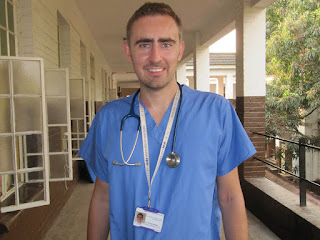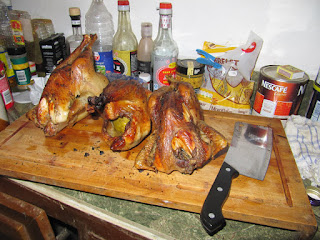My visit home to the UK was brief
and hectic but I was pleased to be able to spend valuable time with my nearest
and dearest. Those I did not get to see;
I hope will be understanding. I have
exchanged a chilly Liverpool for a humid Freetown where there is a temperature
difference of 30 degrees and I am trying, but failing to re-acclimatise to the
heat. The sun has set and it is dark as
I make my way down the jetty to board the sea-coach. Children, still playing on the beach below,
shout hello as I pass and the lights of the city glimmer in the distance across
the harbour. An hour later, I arrive at
my rented house in Murray-town to find it like the Marie Celeste. The lights are out, there is no power in the
neighbourhood and the water tanks are empty.
Life here is now settling into more
of a routine, the novelty of the commute to work through near stationary
traffic is wearing off and on occasion, I admit to struggling a little to climb
out from under my mosquito net at 0630 in the morning when my alarm goes
off. Living and working here can be
testing at times and I have developed more of an appreciation for the freedom
and luxuries that we take for granted at home.
I am also acutely aware that compared to most people in Sierra Leone, we
still have it good and I also accept that I will never be a morning person, no
matter which country I wake up in.
Monday starts at a frenetic pace,
a procession of sick patients arrive at the A&E; we admit a lady in septic
shock, barely breathing into the last medical bed. The next lady is in coma, she is not known to
be diabetic but her blood sugar is over 30 and she is severely dehydrated. The nurses administer insulin and fluid in
the corridor while we wait for a bed.
The triage staff are dealing with a patient that has had a stroke with a
blood pressure above 200 mmHg and one of the community health officers is
assessing another patient with possible heart failure. It continues past two in the afternoon and I
sneak out to do some teaching with our new family medicine doctor who is on
placement with us for a month. I am
called back twice in the following hour for opinions on two patients, the first
is a man with an enlarged tender liver who likely has an abscess, the second
presents with hiccups and turns out to have bowel obstruction due to a massive
inguinal hernia.
I rush over to the hospital board
room for a meeting with a delegation from the West African College of
Surgeons. They are on an accreditation
visit to assess whether Connaught hospital can provide specialty surgical
training. Currently, if doctors wish to
pursue specialty training to become a registrar and consultant, they must train
abroad and this contributes to the brain-drain from which the country suffers. I don’t have time to change and arrive a
little dishevelled. I feel a little under-dressed
in my scrubs as I look around the table to see all the surgeons dressed in suits. Fortunately, I don’t think this will have too
much impact on the outcome of the decision.
The panel members have spent the day with the hospital consultants
inspecting the facilities and will give their report in the next few weeks. The hospital has come through many tough
times over the years and it would be a fantastic boost for the dedicated team
of surgeons here if they are given a positive verdict.
I then manage to catch up with a
couple of my colleagues to discuss a course that we are hoping to run. King’s have helped the hospital to introduce
an early warning score to identify unwell and deteriorating patients on the
intensive care and medical admissions wards.
We are now aiming to organise a pilot course that trains nurses, doctors
and community health officers how to assess and manage these sick patients with
the view to reducing hospital mortality.
The final event of the day is a
Skype link to a medal ceremony in London for the UK staff that worked with
King’s Sierra Leone Partnership during the Ebola outbreak. The partnership was established by the King’s
Centre for Global Health and has been in-country since 2013. The aim is to help strengthen the health
system by working alongside the hospital, College of Medicine and Ministry of
Health. When Ebola broke out, the
organisation remained in Sierra Leone and played a major role in helping the
country to contain the epidemic. Despite
this being an evening of celebration, it is not the end of the story
unfortunately. A 22-year-old girl that
died last week tested positive for Ebola and a relative has subsequently also
been diagnosed with the disease. The
organisation continues to support the health system here and one of its many
roles will be to assist the country in the containment and eradication of this
stubborn virus. I'm ready for the
weekend and it’s only Monday.








